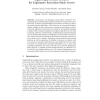Free Online Productivity Tools
i2Speak
i2Symbol
i2OCR
iTex2Img
iWeb2Print
iWeb2Shot
i2Type
iPdf2Split
iPdf2Merge
i2Bopomofo
i2Arabic
i2Style
i2Image
i2PDF
iLatex2Rtf
Sci2ools
146
click to vote
CC
2006
Springer
2006
Springer
Lightweight Lexical Closures for Legitimate Execution Stack Access
We propose a new language concept called "L-closures" for a running program to legitimately inspect/modify the contents of its execution stack. L-closures are lightweight lexical closures created by evaluating nested function definitions. A lexical closure can access the lexicallyscoped variables in the creation-time environment and indirect calls to it provide legitimate stack access. By using an intermediate language extended with L-closures in high-level compilers, high-level services such as garbage collection, check-pointing, multithreading and load balancing can be implemented elegantly and efficiently. Each variable accessed by an L-closure uses private and shared locations for giving the private location a chance to get a register. Operations to keep coherency with shared locations as well as operations to initialize L-closures are delayed until an L-closure is actually invoked. Because most high-level services create L-closures very frequently but call them infrequen...
| Added | 20 Aug 2010 |
| Updated | 20 Aug 2010 |
| Type | Conference |
| Year | 2006 |
| Where | CC |
| Authors | Masahiro Yasugi, Tasuku Hiraishi, Taiichi Yuasa |
Comments (0)

